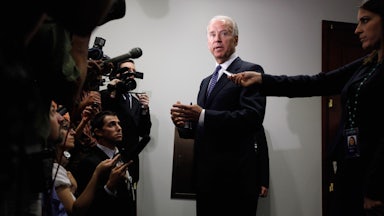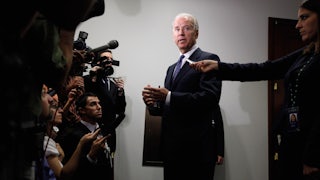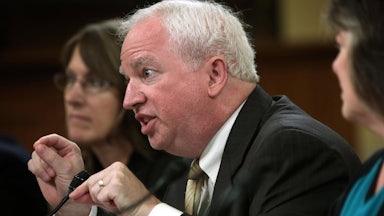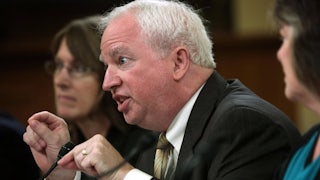Why do the Democrats behave this way? We’ve heard the standard answers. They’re not as disciplined as the Republicans, instinctively less inclined to obey orders (a good thing). They’re more ideologically diverse (also a good thing, up to a point). They actually care about policy outcomes, unlike Republicans, so they have genuine substantive disagreements (another good thing—again, up to a point).
But here’s another reason, and this one is not a good thing. They, or at least some of them, have no grasp of the historical moment in which they find themselves. And this moment is unlike anything any of them have lived through, anything the country has been through: The opposition party is trying to destroy democracy. Republicans all over the country are passing laws and making rules in broad daylight that will allow them to overturn the results (if adverse) of the next presidential election. They’re not hiding this. They’re advertising it. John Eastman’s memo is Exhibit A, but we also have exhibits B through double-Z. They couldn’t be making their intentions clearer.
So the Democrats have to be the party of democracy. That means they need to make some obvious moves, such as protecting voting rights, which seems tragically iffy at the moment; but it also means, as Joe Biden repeatedly and correctly says, that they need to show the country that democracy works and can produce positive outcomes. If they don’t manage to come to terms on this reconciliation bill, the negative impacts won’t be merely economic. This reconciliation bill is about democracy. If they don’t pass it and don’t show that democracy works, especially with the government in the hands of one party, the Republican Party will benefit—they’ll almost certainly take the House and the Senate in 2022, and they’ll be teed up to steal the 2024 election for Donald Trump, and American democracy will be on life support.
This is what the Democrats need to understand. Joe Manchin’s statement last week, about this much spending being “the definition of fiscal insanity,” was distressing in the first instance because it was awful economics—it was Democratic Leadership Council talking points circa 1995.
But it was bad also because it showed no understanding of this precarious moment in history and mortal threat facing our democracy. Yes, there were standard nods to hoping that common ground could be found, but there was no language in that statement that demonstrated that he recognizes that the Democrats must now come together to prove that government can deliver services to its citizens. That is what matters, and that’s where any Democrat’s emphasis should be.
Democrats should have recognized this from the start and passed both the infrastructure bill and the reconciliation bill in September at the latest. They also should have raised the minimum wage earlier this year. If $11 was as high as Manchin was willing to go, then $11 it shall be. That wasn’t just Manchin, or even Kyrsten Sinema, with her appalling theatrical thumbs-down. Eight Senate Democrats voted against $15. So fine, make it $11. There’s a huge difference between $7.25 and $11, and the people earning those paltry wages would notice the boost immediately. I hope to God that the idea of some kind of minimum wage increase isn’t dead in this Congress.
Democrats don’t seem to see the bigger picture. They bicker and posture as if these are normal times and democracy isn’t at stake. Obviously, I’m more sympathetic to Pramila Jayapal and the progressives than to Manchin, Sinema, and others on the party’s right flank. Jayapal’s position here, for the full $3.5 trillion, isn’t some radical leftist position. It’s the president’s position! And we even learned last week that it’s to the right of David Brooks, who wants $4 trillion!
It’s also a position in favor of a set of proposals that poll extremely well overall. To take one example, 93 percent of Democrats and 78 percent of Republicans support subsidized childcare, Elizabeth Warren’s pet project. Americans want these things. Numbers are similar for many other programs in the bill. Have a gander at these figures from a poll of several swing House districts. They’re pretty overwhelming.
Finally, it’s also a position in favor of a group of programs that would bring enormous benefits to depressed parts of this country. That is to say, in red America—in our dear West Virginia, Senator Manchin—these programs would create thousands of jobs. And most of them for people without a college education! All those states so full of Trumpy rage would benefit tremendously from the various pieces of this reconciliation puzzle (and from the infrastructure bill, too). The Democrats, or most of them anyway, do say this, but not nearly enough, and they’ve let the argument become far too focused on the top-line number (I wrote two weeks ago about how they can still reframe that).
Jayapal should stand her ground. However, she also has to recognize that unfortunately, it’s a sad fact that Manchin and Sinema have more leverage than she and the progressives do, because each of them can single-handedly kill the bill. But she rose to the occasion. She has greatly enhanced her status and reputation, and I think it’s clear now to Nancy Pelosi and House moderates that progressives aren’t going to be doormats anymore. There will come a day, I hope this week, when Jayapal realizes all this, taps on the brakes, and accepts the reality of, say, something around $2 trillion, which is still a hell of a lot of money and would rank this legislation up there near Social Security and Medicare/Medicaid in terms of historic significance.
And Manchin has to play ball, as well. I get the sense for now that he will. As for Sinema, who knows, she’s so weird, but if Manchin is in, I very much doubt she’s weird enough to decide to wreck the Biden presidency and her party’s near-term future prospects single-handedly.
And I hope Pelosi and Chuck Schumer are telling their caucuses every day, if not every hour: Gang, this isn’t about money or government programs. It’s about democracy.










